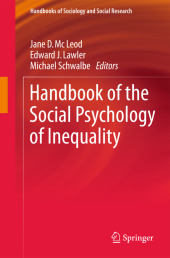 Neuerscheinungen 2015Stand: 2020-02-01 |
Schnellsuche
ISBN/Stichwort/Autor
|
Herderstraße 10
10625 Berlin
Tel.: 030 315 714 16
Fax 030 315 714 14
info@buchspektrum.de |

Edward Lawler, Jane McLeod, Michael Schwalbe
(Beteiligte)
Handbook of the Social Psychology of Inequality
Herausgegeben von McLeod, Jane; Lawler, Edward; Schwalbe, Michael
1st ed. 2014. 2015. xxv, 749 S. 9 Tabellen, 2 Farbtabellen. 254 mm
Verlag/Jahr: SPRINGER NETHERLANDS; SPRINGER 2015
ISBN: 9401773483 (9401773483)
Neue ISBN: 978-9401773485 (9789401773485)
Preis und Lieferzeit: Bitte klicken
This volume provides the first comprehensive overview of social psychological research on inequality for a graduate student and professional audience. Drawing on all of the major theoretical traditions in sociological social psychology, its chapters demonstrate the relevance of social psychological processes to this central sociological concern. Each chapter in the volume has a distinct substantive focus, but the chapters will also share common emphases on: - The unique contributions of sociological social psychology - The historical roots of social psychological concepts and theories in classic sociological writings - The complementary and conflicting insights that derive from different social psychological traditions in sociology. This Handbook is of interest to graduate students preparing for careers in social psychology or in inequality, professional sociologists and university/college libraries.
Preface.- Introduction.- Section I. Orienting Perspectives and Concepts.- Chapter 1. Status: Cecilia L. Ridgeway and Sandra Nakagawa.- Chapter 2. Theoretical Perspectives on Power and Resource Inequality; Shane Thye and Will Kalkhoff.- Chapter 3. Stigma and Social Inequality; Bruce G. Link, Jo C. Phelan, and Mark Hatzenbeuhler.- Chapter 4. Inequality: A Matter of Justice?; Karen A. Hegtvedt and Deena Isom.- Chapter 5. Intersectionality; Judith A. Howard and Daniel G. Renfrow.- Section II. Creating, Reproducing, and Resisting Inequality.- chapter 6. Constructing Difference; Amy C. Wilkins, Stefanie Mollborn and Bor_ka B_.- Chapter 7. Dramaturgy and Dominance; Michael Schwalbe and Heather Shay.- Chapter 8. Language and Talk; Jocelyn A. Hollander and Miriam J. Abelson.- Chapter 9. Social Capital and Inequality: The Significance of Social Connections; Karen S. Cook.- Chapter 10. Social Justice and Local Systems of Interpersonal Influence; Noah E. Friedkin.- Chapter 11. Theoretical and Substantive Approaches to Socialization and Inequality in Social Psychology; Jeylan T. Mortimer and Heather McLaughlin.- chapter 12. Self, Identity, and Social Inequality; Peter L. Callero.- Chapter 13. Emotions and Affects as Source, Outcome, and Resistance to Inequality; Steven Foy, Robert Freeland, Andrew Miles, Kimberly B. Rogers and Lynn Smith-Lovin.- Chapter 14. Ideologies; Matthew O. Hunt.- Chapter 15. Legitimacy and Inequality; Henry A. Walker.- Section III. Contexts of Inequality.- Chapter 16. Unequal but Together: Inequality within and between Families; Kathryn J. Lovely, Jamie Oslawski-Lopez and Brian Powell.- Chapter 17. Schools; Barbara Schneider, Justine Judy and Kri Burkhander.- Chapter 18. The Social Psychology of Inequality at Work: Individual, Group and Organizational Dimensions; Nancy DiTomaso and Rochelle Parks-Yancy.- Chapter 19. Social Psychological Processes in Studies of Neighborhoods and Inequality; Lincoln Quillian.- Section IV. Dimensions of Inequality.- Chapter 20. The Social Psychology of Gender Inequality; Amy Kroska.- Chapter 21. Ethno-Racial Attitudes and Social Inequality; Frank L. Samson and Lawrence D. Bobo.- Chapter 22. Current Theorizing and Future Directions in the Social Psychology of Social Class Inequalities; Melissa A. Milkie, Catharine H. Warner and Rashawn Ray.- Chapter 23. The Social Psychology of Immigration and Inequality; Guillermina Jasso.- Chapter 24. The Life Course and the Social Organization of Age; Lynn Falletta and Dale Dannefer.- Chapter 25. Sexualities; Douglas P. Schrock, J. Edward Sumerau, and Koji Ueno.- Section V. Outcomes of Inequalities.- Chapter 26. Social Movements and Social Inequality: Toward a More Balanced Assessment of the Relationship; David A. Snow and Peter B. Owens.- Chapter 27. Social Inequality, Crime and Deviance; Ross L. Matseuda and Maria Grigoryeva.- Chapter 28. Health Inequalities; Jane D. McLeod, Christy L. Erving and Jennifer Caputo.- Index.


